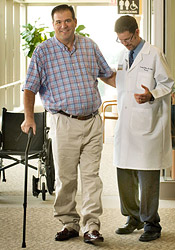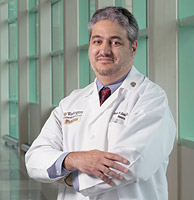The Danforth Foundation has granted the Hope Center for Neurological Disorders at Washington University School of Medicine in St. Louis a $10 million endowed gift for research into a range of conditions that cause injury and impairment to the brain and central nervous system.
The funds will be used to support innovative and groundbreaking new ideas for research with clear potential to improve diagnosis and treatment of patients with amyotrophic lateral sclerosis (ALS), Parkinson’s disease, stroke, Huntington’s disease, multiple sclerosis, cerebral palsy and other disorders.
The endowment created by the gift will be named for the late Donald Danforth Jr., a 1955 graduate of the Olin Business School at Washington University who was executive vice president of Ralston-Purina Co., a notable entrepreneur and a trustee of the Foundation. Danforth was the brother of Washington University Chancellor Emeritus William H. Danforth, former U.S. Senator John Danforth and St. Louisan Dorothy Danforth Miller.

The University and Hope Happens have committed to raising additional matching endowed funds of $10 million for the same research programs over the next five years. The Hope Center was created in 2004 as a partnership between Washington University and Hope Happens, a public charity started by Christopher Hobler, who lost his life to ALS in 2005.
“This gift is an outstanding example of how Washington University, Hope Happens and the St. Louis community continue to benefit from the generosity and leadership of the Danforths and the Danforth Foundation,” says Chancellor Mark S. Wrighton. “As science develops a new generation of treatments for some of society’s most devastating disorders, this donation and the mandate for additional fundraising that comes with it help ensure that Washington University and the Hope Center remain at the forefront of the field in research that will alleviate suffering and find solutions for earlier diagnosis and treatment.”
“The support of the Danforth family has been at the center of so much that is good at Washington University,” says Mark P. Goldberg, M.D., professor of neurology, neurobiology and of biomedical engineering, and director of the Hope Center. “In particular, the family has been enthusiastic supporters of the Hope Center since its beginning. This new gift will be incredibly helpful in advancing one of our primary missions: funding innovative new directions in diagnosis and treatment of neurological disorders.”
“As a physician, William Danforth knows what an important front these terrible conditions present in the battle for improved health and longevity,” says Larry J. Shapiro, M.D., executive vice chancellor of medical affairs and dean of the School of Medicine. “The Danforth Foundation’s generous new gift recognizes the bench-to-bedside research model we’ve fostered here at Washington University School of Medicine through our BioMed 21 program as one of the best hopes for new treatments and cures for these disorders.”

“This gift in honor of my brother, Don, means a lot to the family,” says William H. Danforth, who is a member of the Foundation board. “We all have great hopes that the discoveries of the wonderful scientific leaders of the Hope Center will help halt and prevent ALS and similar devastating diseases.”
“Our entire family gives thanks to Dr. Danforth, his family and the Hope Center for making the dream of collaborative research for neurological disorders become a reality,” says Jean Hobler, mother of Christopher Hobler and founding member of Hope Happens. “My son, Christopher Hobler, would be very proud. Hope is alive and growing!”
The Hope Center helps support the studies of more than 70 faculty and 500 scientists with shared research facilities and annual distribution of seed grants.
“Through funding from Hope Happens, we’ve already had successes from these seed grants that have led to additional research funding from government sources and other agencies,” says David Holtzman, M.D., the Andrew B. and Gretchen P. Jones Professor and head of the Department of Neurology. “One example is the search for genes linked to ALS that is likely to help us better understand the disorder and advance toward a treatment. Another is to help development of a technique that lets us much more rapidly and directly assess the impact of new drugs for neurodegenerative diseases.”
According to Holtzman, the Danforth Foundation grant will help the Hope Center expand this annual grant program, building on the success it has already had.
“Nothing will accelerate discovery more than empowering talented investigators in their attack against neurodegenerative diseases,” says Goldberg.
Washington University School of Medicine’s 2,100 employed and volunteer faculty physicians also are the medical staff of Barnes-Jewish and St. Louis Children’s hospitals. The School of Medicine is one of the leading medical research, teaching and patient care institutions in the nation, currently ranked fourth in the nation by U.S. News & World Report. Through its affiliations with Barnes-Jewish and St. Louis Children’s hospitals, the School of Medicine is linked to BJC HealthCare.
Hope Happens is a public charity dedicating to improving the quality of life of people with neurodegenerative disorders. It does this by promoting collaborative research with the potential to fast-track cures by translating basic scientific breakthroughs into new therapies. 7,650 people are diagnosed with a neurological disorder every day, 2.5 times the number diagnosed with cancer. Hope Happens has earned the Accredited Charity seal of approval by the Better Business Bureau. For more information, visit www.hopehappens.org or call 314 (289-5660).
